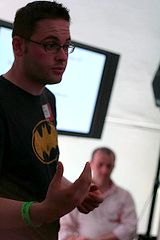Get posts sent to your inbox:
Communities in ‘Control’? Meh.
On the day that the results of a poll in London reveal that, while one in four Londoners would like to be a local politician, hardly anyone knows anything about them or what they do, Hazel Blears has a piece published asking for councillors to be given more control.
First up, that survey. Reported on 24dash.com:
One in four Londoners are interested in becoming a local councillor – despite widespread ignorance about what their councils actually do, according to a survey commissioned by London Councils.
The poll, carried out by Ipsos MORI, revealed that almost half the people surveyed incorrectly believe that their local council runs the police and hospitals.
Only two in five people know which political party runs their own local council, and just 6 per cent of Londoners know the name of their council’s leader.
But despite this, one in four said they would be interested in standing for election as a local councillor.
The results also showed that many people were confused about the role of a councillor. While 71 per cent of people know that councillors receive some payment for their council work, 52 per cent wrongly believe they must represent a political party and 32 per cent think they must hold a formal qualification.
This of course is nothing new, and not unique to London. People are not generally aware of what their local authorities do for them. Whether they would still be so interested in being a councillor once they knew what it’s about might be another matter.
Hazel Blears, Communities and Local Government Minister, thinks councillors, like everyone else these days, need to be ’empowered’:
…the white paper will include a new set of powers for local authorities to be able to promote democracy. This ‘duty to promote democracy’ will mean that local councils are placed in their proper context: not as units of local administration, but as lively, vibrant hubs of democracy.
All this will be revealed in the community empowerment white paper – Communities in Control – to be published this Wednesday (9/7/08). That’s a bit of a weird title, isn’t it? Isn’t control what most of this stuff is supposed to not be about?
Andrew Brown has his say on the matter, tying things in neatly to his local context:
My guess is that Hazel wouldn’t see Lewisham as somewhere which has too many problems on this front, and she’d be right, to an extent. The development of ward based assemblies seems to significantly enhance the community leadership opportunities for councillors, and my experience was that Lewisham’s officers have a healthy respect for the democratic mandate. But, I still think that more could be done to promote the decisions that are being taken and the political debates that are currently being had by our elected representatives.
I had a chance to have a modest input into the White Paper by attending Simon Berry’s Web24Gov workshop at CLG last month. I doubt the whole eDemocracy/eGovernment/eWhatever agenda will get much of a mention, which is a shame as it is potentially so important.
Social web tools help people get together – the proof is in the number of STDs people are catching. Now, there is no reason why this stuff can’t be used to get people into town halls as well as clap clinics.
- The rise in working hours and commutes means that a lot of people don’t have the time or energy to go out to meetings or other events. That doesn’t mean that they don’t want to be involved however, and the social web provides an ideal interface for them to do so remotely.
- The use of tagging and aggregation means that people can quickly and easily find the information they want on the web – provided they can find and are comfortable with the right tools to do so.
- The use of new media communication tools allows local politicians and activists to put their message directly to the people, without the need to go through the filter of the local press. It also means they can get feedback through comments – both positive and negative – and can respond in kind, thus creating a dynamic conversation. The CivicSurf project promotes this brilliantly.
Do I think that the social web is the cure to all the problems of local democracy? Of course not. But I do think it can help, and it can help quickly and cheaply. My message to civic leaders: Keep doing surgeries. Keep distributing newsletters. But just spend a bit of time getting to know these new media forms, because they offer a direct line to people who might just have the ideas and enthusiasm you are looking for.
But talk of ‘control’ – however defined and however well intentioned – doesn’t really do anyone any good at all.



